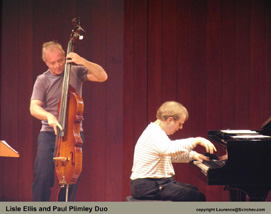Texts © Stuart Broomer & Laurence Svirchev, Photography ©Laurence Svirchev
Jazz em Agosto—Jazz in August—is a festival with any number of differences, an event that in recent years has spanned a few days or two weeks, presenting both the celebrated and the little-known with the emphasis on innovative work. The festival is sponsored by the Gulbenkian Foundation, part of the extraordinary legacy of Calouste Gulbenkian whose name adorns the museum and art gallery that house the festival and also the park that surrounds them all. The festival’s concerts are scaled to the available halls, ranging from a small, almost vertical, lecture hall to a concert hall extraordinary for both its physical beauty and acoustics.
What makes all of this most remarkable is the creative vision of artistic director Rui Neves, who often programs the festival to emphasize a single country’s music. This year half of the festival’s 12 performances were devoted to Canadians, including four performances that provided an international forum for groups from the fertile Vancouver scene. The festival was bracketed by big bands from Canada’s opposite coasts, opening on Tuesday with Vancouver’s NOW Orchestra conducted by George Lewis and ending on Sunday with the Paul Cram Orchestra made up of musicians from Southern Ontario to Nova Scotia. The symmetry was highlighted by the two concerts taking place in the Gulbenkian’s stunning concert hall, the only night-time performances brought indoors by the threat of rain. The evening concerts in between took place in the outdoor Anfiteatro, another gorgeous setting for music and one taking advantage of Lisbon’s balmy August evenings.
For at least three decades starting with the innovative pianist Al Neil, Vancouver has created a continuous stream of highly collaborative, idiomatic music. Yet that scene has been largely isolated from the rest of the world, its scope never represented outside the city. In a prescient and audacious programming move Rui Neves may have broken that isolation by presenting four Vancouver-based bands at the 2004 festival.
Literature and music are potent forces in the culture of any country and Neves’ recognition of the Vancouver scene might have its roots in the Portuguese literary imagination. In the nineteen twenties and thirties, poet Fernando Pessoa (d.1934) hung out in Café Brasileira in one of the old quarters of Lisbon. There he wrote under four names, his own and three heteronyms. These heteronyms were neither contrived or pseudonymic; each existed as a dissimilar, idiomatic poetic voice.
The concept of heteronymity fits the Vancouver musical scene perfectly. No singular voice or style dominates, musicians float among established working bands and come-as-they-may improvising assemblages. Lisbon has had its Café Brasileira for poetry (and “bica”, Portuguese slang for expresso); Vancouver has its old Glass Slipper, Studio 1016, and the Western Front as cauldrons for new music. Both cities are continental endpoints before oceans loom as the edge of the world. Perhaps it is the edge of the world syndrome that provokes the imagination to heightened creativity.
 Jazz em Agosto’s programme started with a big bang, the NOW Orchestra’s complement of 16 musicians playing a constellation of five intricate compositions from George Lewis and Coat Cooke.
Jazz em Agosto’s programme started with a big bang, the NOW Orchestra’s complement of 16 musicians playing a constellation of five intricate compositions from George Lewis and Coat Cooke.
After 25 years of continuous activity, free improvisation and tight ensemble playing come naturally to NOW. With Lewis on-board as conductor, composer, and soloist, NOW enters a hyper-realm that levitates the stage, becoming a polar star of large improvising ensembles. The performance began with Lewis conducting his “Concerto for NOW” (adapted from his “Virtual Concerto”). It opens with a simple three note motif from the reeds, followed by a silent space and then a one note ensemble sound. After six cycles and variations, the band dropped out and Kevin Elaschuk (trumpet) and Clyde Reed (bass) began articulating extended notes against each other. Section two was a funk section, the entire band swinging behind a trombone solo. Section three was an conducted improvisation backing a Paul Plimley solo. The next three sections had cellist Peggy Lee warping and weaving through improvisations by piano, Kate Hammett-Vaughn’s voice, and the reed sections, it all ending with a group improvisation.
Cooke conducted an elegy, “Broken Dreams.” It began with two basses voiced in the lowest register, then ascended into a high velocity Plimley piano. A series of reveries were then suggested by Hammett-Vaughn’s voice. The composition was about the supercharged and discordant emotions that come from the erratic pulses of a confused mind, ending on a saxophone solo suggesting acceptance of unfulfilled aspirations. While Cooke’s compositions tend toward autobiography, they are also complex works containing a broad range of color.
 The audience in the outdoor Anfiteatro looks down on a well-lit stage, the backdrop of which is a grass field and a pond containing ducks among the reeds. The tall trees that surround it muffle the sounds of the city. It’s a magical setting for a stage. The Peggy Lee Band’s concert was no less magical than the setting. The band has a unique sound: Lee’s voicings of trombone (Jeremy Berkman), trumpet (Brad Turner) and cello can be mellifluous. With bassist Andre Lachance holding the swing chair, the flip side of the honey is the raucous ability of Lee, guitarist Ron Samworth, and guitarist Dylan van der Schyff to project an edgy contemporary sound.
The audience in the outdoor Anfiteatro looks down on a well-lit stage, the backdrop of which is a grass field and a pond containing ducks among the reeds. The tall trees that surround it muffle the sounds of the city. It’s a magical setting for a stage. The Peggy Lee Band’s concert was no less magical than the setting. The band has a unique sound: Lee’s voicings of trombone (Jeremy Berkman), trumpet (Brad Turner) and cello can be mellifluous. With bassist Andre Lachance holding the swing chair, the flip side of the honey is the raucous ability of Lee, guitarist Ron Samworth, and guitarist Dylan van der Schyff to project an edgy contemporary sound.
The band played material from her latest CD World’s Apart. The opener was a composition by the same name in which Turner and Berkman stated a beautiful mid-tempo melody/improvisation. The composition segued to an extended cello and drums improvised introduction to “Soft Scrape.” I particularly enjoyed “Beekeepers Club.” Just before the first note was hit, the quacks of several ducks settling for the night sounded through the calm air. And just as Brad Turner launched into his take-flight solo, the sound of a landing jet-liner provided a roaring throttling-back turbo-charged engines. Berkman provided the antipodal voicing to Turner, the sounds that trademark this band.
Lee’s music provokes the purest of emotional responses. From my Vancouver listening experience, it is difficult to come out of a Lee concert without feeling a deep inner peace from the her music’s grace and warmth. I suspect that the Lisbon audience felt the same way.
François Houle opened his Electro-Acoustic Quartet set with a slap-tongue and ended with a misterioso shakuhachi-like whistle. In between those two sounds was encapsulated a brilliant display of electro-acoustic improvisation, composition, and soloing by the quartet. Much of the music was an enhanced reprise of his radio-phonic CD Au Coeur du Litige about the devastating Québec ice-storms of 1998. That initial slap tongue was immediately followed by a bass drum hit and a symbol tap by Dylan van der Schyff. With the drum kit electronically linked through Houle’s processing units, these three simple actions unleashed a sequence of digital processing which turned a single clarinet into a symphony of sound.
In marked contrast to the hospitable Lisbon night air, we heard poet Catriona Strang’s processed voice calling ice “this mountain of despite” and other poetry from the original work. Later in the concert, Houle worked a piece around a Morton Feldman stand-up comedic-satiric routine which discusses the relation between musicians and audience. Feldman quotes Boulez: “When people applaud they are really applauding their own good taste.” New music permits such provocation.
What I hear from Houle in recent years is a music delving into the realm of social commentary. This can be a danger zone for artists, but Houle chooses his statements wisely. Immediately after broadcasting Feldman’s voice, he and van der Schyff launched into a high-velocity improvisation of processed clarinet solo and drums, a nice contrast between thought and music. In a pleasant relief from ice storms, satire, and electronically-enhanced double-clarinet playing, bassist Chris Tarry played a beautiful solo from Au Coeur du Litige accompanied by van der Schyff’s cymbal splashes that captured nature healing itself after the storms abated.
 The gelato of the west-coast Canadian sets was the Paul Plimley-Lisle Ellis duo. Plimley and Ellis have been playing together for over two decades and have achieved an elegantly synchronous musicality. Their set was a confluence of improvisational and jazz history as they wove their way through free-compositions and then executed stop-on-a-pixel turnarounds. The opening composition, an Ellis-Plimley tale called “In-Situ,” had a slippery eel quality. Just when you thought the melodic fragments were purling, the music slid away in another direction. The Mingus composition “Self Portrait in Three Colors” was sight-read at a slow cadence, rendering it tender and loving. Fragments of Charlie Parker’s “Relaxing at Camarillo” appeared out of nowhere and several in the audience laughed when Jimi Hendrix’ “Up from the Skies” laced its way into the closing composition.
The gelato of the west-coast Canadian sets was the Paul Plimley-Lisle Ellis duo. Plimley and Ellis have been playing together for over two decades and have achieved an elegantly synchronous musicality. Their set was a confluence of improvisational and jazz history as they wove their way through free-compositions and then executed stop-on-a-pixel turnarounds. The opening composition, an Ellis-Plimley tale called “In-Situ,” had a slippery eel quality. Just when you thought the melodic fragments were purling, the music slid away in another direction. The Mingus composition “Self Portrait in Three Colors” was sight-read at a slow cadence, rendering it tender and loving. Fragments of Charlie Parker’s “Relaxing at Camarillo” appeared out of nowhere and several in the audience laughed when Jimi Hendrix’ “Up from the Skies” laced its way into the closing composition.
Jazz em Agosto provided the opportunity for not only a Portuguese audience to hear some of Vancouver’s strongest bands in an other-worldly setting. Pessoa’s heteronymic consciousness seemed to pervade the musical atmosphere and I couldn’t help but wonder how a master poet from the first third of the last century would have appreciated today’s musicality.
Editors note: This review was originally published in Coda, The Journal of Jazz and Improvised Music, November/December 2004 by Stuart Broomer and Laurence Svirchev. In this edition, the texts have been separated into independent reviews.